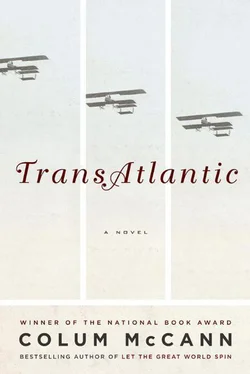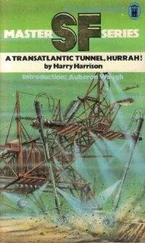It will be morning now in New York. He will fly to London, then home. He will get there by noon. First off the plane. He will leave, for a moment, all decorum behind. He will emerge through customs to see her there, leaning forward, over the barrier, waiting. Dark hair with a ray of gray. Sunglasses on her head. The most eloquent of welcomes. He will take Andrew in his arms. Lean down towards him. Fasten both of them in an embrace.
Or he will call ahead and talk to her and have her waiting downstairs. In the marbled lobby. Her hands against the glass. With his son in the papoose against her chest. The quick kick of her heel backwards in the air. Like women from other wars. She will spin out through the revolving doors, four quarters, provinces of desire.
Or he will surprise her entirely. Arrive without a word. Make his way through the airport, walk quickly along the corridor, out the door into the brief light, Ramon waiting by the overhang in his flat cap. The highways. The bridges. The green signs. The crush of yellow traffic. Through the arc of the tollbooth. Over the bridge. Ramon will dip down through Harlem, speed west, swing south along Broadway. The families out walking in the hard yellow sunshine. Young women with dogs. Children in baseball caps. Near Lincoln Center, they will slow down, ease across the lanes. Ramon will pull sharply into the curved driveway. The Senator will leave the briefcase in the back of the car. No reporters please. No cameras. No notebooks. He will push open the revolving door. A series of nods and smiles. Ask the doormen not to call up. No warning. He will want to surprise her. At least for an instant. He will hope that she doesn’t hear the elevator bell. He will softly key open the door and ghost through the room, across the carpet, into the bedroom, catch them sleeping, a noontime nap. He will pause a moment, watching. Her hair askew. Her body long and slim and quiet against the sheets. The baby against her. Slip off his shoes, his suit jacket, his sweater. Lift the bed sheet. Easter Sunday. Crawl into bed beside them. The cool of the pillow. The sheer slice of sunlight through the room. Waken them to laughter. The pinch of his skin. Hers. The slow curve of her hip.
A walk, then, to Sheep Meadow. The grass cool to the touch. The skyscrapers gray and huge against the trees. To be allowed to feel small again. To embrace that insignificance. The sun over the west side of Manhattan. Falling. The dark rolled backwards.
The car drives on. Beyond Belfast now, into the countryside. The light on the slant of the fields. Fenced here, unbounded there.
There is always room for at least two truths.
But this is not the story of a life.
It is the story of lives, knit together,
overlapping in succession, rising
again from grave after grave.
— WENDELL BERRY, FROM “RISING”
SHE STOOD AT THE WINDOW. IT WAS HER ONE HUNDRED AND twenty-eighth day of watching men die. They came down the road in wagons pulled by horses. She had never seen such a bath of killing before. Even the horses seemed incredulous. Kicking up dust behind them. Their eyes huge and sad. The wheels screeched. The line of wagons stretched down the path, into the trees. The trees themselves stretched off into the war.
She came down the stairs, through the open doors, into the wide heat. The wagons were already backed up on the road. A curious quiet. The men had exhausted their shouts. They were left with small whimperings, tiny gasps of pain. The ones sitting appeared to be asleep. The ones lying were packed so close together, breathing in unison, that they appeared as one mass. A contortion of blood and limbs. Rotting leather breeches. Stinking flannel shirts. Flesh ripped open: cheeks, arms, eye sockets, testicles, chests. The beds of their wagons were black with blood. It had fallen on the wheels, too, so that their lives seemed to circle and turn beneath them.
One soldier wore sergeant’s stripes on his sleeve, and a gold harp stitched on his lapel. An Irishman. She had tended to so many of them. He was wounded in the neck. It was covered with a filthy gauze. His face was various shades of dark from the blown-back powder. His teeth were blackened from biting cartridges. He moaned and his head lolled sideways. She swiped the wound as clean as she could get it. His windpipe made a sad low noise. He would be dead within minutes, she knew. Small black strips of shadow moved over him. She looked up. Vultures flew overhead. They did not strike a wingbeat. Soaring on the thermals. Waiting. She had a brief thought that she should smother the injured man.
She touched his eyes. She could feel his life fall shut beneath her fingers. No need to stop his breath. It was much like drawing a small red curtain across. So many of them waited until they were in a woman’s hands.
SHE WAS TAPPED on the elbow. The doctor was small and rotund. They would have to lift the men from the wagon, he said, get them onto the grass. He wore a bow tie splattered with blood. A rubber apron over his tunic. There were twelve other nurses working the wagons: four women.
They lifted the soldiers as gently as they could and placed them in the grass in the imprints of others who had been there just hours ago. All around, the grass was exhausted by the shape of the war.
The doctors paced along the length of the dying. They chose which ones they might possibly save. The soldiers groaned and stretched out their arms. She wanted immediately to wash them clean. The other nurses had lined up wooden pails of water, with sponges at their heads. She thrust a towel down into a bucket.
Lily herself had crossed more water than she cared to remember. She had often thought that she could use all the wide Atlantic to wash them.
THEY CARRIED THE living inside on stretchers. Slippery with blood. The injured sat, vacant, in their beds. The hospital had been a glass factory once. Some of the men had rescued pieces of glass and ranged them around their beds. Intricate vases, colored tumblers. There had been a small amount of stained glass made for the churches of Missouri, but most of it had been taken away and sold.
Occasionally a loud shattering went through the hospital when a soldier stumbled out of bed, or lost his mind, or thrashed his way out from the sheets, or knocked over his bedside table. In the basement below, large glass sheets were still kept. There had been dozens of mirrors, too, but they had been hidden away so the men couldn’t see what had become of them.
LILY HAD LEFT St. Louis in the same week as her son. To be near his regiment. He was seventeen years old. A head of chestnut-colored hair. A shy boy once, he had left, swollen with the prospect of war.
She had walked for days, found the hospital among a series of small buildings not far from the battlefields. At first she was given the laundry room to work in. They had set up a little makeshift hut out back. The hut was a collection of logs with a sloping tarpaulin roof. Under the snapping tarp sat a row of six wooden barrels, four to be filled with hot water, two with cold. She wore long gloves and thick boots. Mud splashed up on the back of her dress. Her hem was dark and thick with blood. She washed bed sheets, towels, bandages, medical uniforms, torn blouses, forage caps. She stirred the clothes around a wooden drum. Another barrel rolled two drums together to squeeze the dirt from the fibers. The handle circled endlessly. Her hands blistered.
When the water was finished, she sprinkled lime in the barrels. It was said to kill the smell of blood. She hung the clothes high on a washing line. At night coyotes trotted out high-legged from the nearby forest. Sometimes they leaped and ripped the clothes from the line. She could see strips of white scattered through the trees.
Читать дальше












